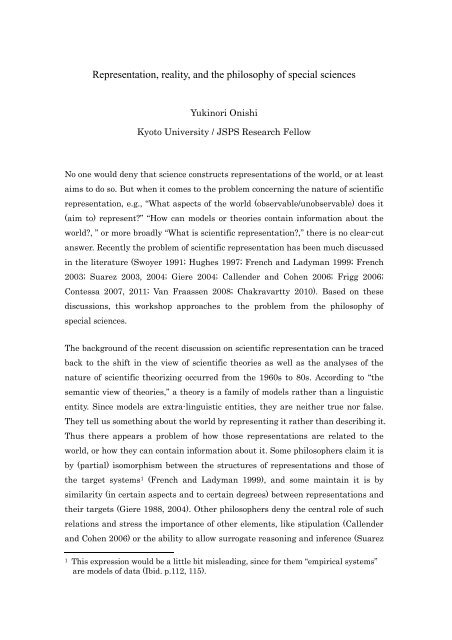Representation, reality, and the philosophy of special sciences
Representation, reality, and the philosophy of special sciences
Representation, reality, and the philosophy of special sciences
You also want an ePaper? Increase the reach of your titles
YUMPU automatically turns print PDFs into web optimized ePapers that Google loves.
<strong>Representation</strong>, <strong>reality</strong>, <strong>and</strong> <strong>the</strong> <strong>philosophy</strong> <strong>of</strong> <strong>special</strong> <strong>sciences</strong><br />
Yukinori Onishi<br />
Kyoto University / JSPS Research Fellow<br />
No one would deny that science constructs representations <strong>of</strong> <strong>the</strong> world, or at least<br />
aims to do so. But when it comes to <strong>the</strong> problem concerning <strong>the</strong> nature <strong>of</strong> scientific<br />
representation, e.g., “What aspects <strong>of</strong> <strong>the</strong> world (observable/unobservable) does it<br />
(aim to) represent?” “How can models or <strong>the</strong>ories contain information about <strong>the</strong><br />
world?, ” or more broadly “What is scientific representation?,” <strong>the</strong>re is no clear-cut<br />
answer. Recently <strong>the</strong> problem <strong>of</strong> scientific representation has been much discussed<br />
in <strong>the</strong> literature (Swoyer 1991; Hughes 1997; French <strong>and</strong> Ladyman 1999; French<br />
2003; Suarez 2003, 2004; Giere 2004; Callender <strong>and</strong> Cohen 2006; Frigg 2006;<br />
Contessa 2007, 2011; Van Fraassen 2008; Chakravartty 2010). Based on <strong>the</strong>se<br />
discussions, this workshop approaches to <strong>the</strong> problem from <strong>the</strong> <strong>philosophy</strong> <strong>of</strong><br />
<strong>special</strong> <strong>sciences</strong>.<br />
The background <strong>of</strong> <strong>the</strong> recent discussion on scientific representation can be traced<br />
back to <strong>the</strong> shift in <strong>the</strong> view <strong>of</strong> scientific <strong>the</strong>ories as well as <strong>the</strong> analyses <strong>of</strong> <strong>the</strong><br />
nature <strong>of</strong> scientific <strong>the</strong>orizing occurred from <strong>the</strong> 1960s to 80s. According to “<strong>the</strong><br />
semantic view <strong>of</strong> <strong>the</strong>ories,” a <strong>the</strong>ory is a family <strong>of</strong> models ra<strong>the</strong>r than a linguistic<br />
entity. Since models are extra-linguistic entities, <strong>the</strong>y are nei<strong>the</strong>r true nor false.<br />
They tell us something about <strong>the</strong> world by representing it ra<strong>the</strong>r than describing it.<br />
Thus <strong>the</strong>re appears a problem <strong>of</strong> how those representations are related to <strong>the</strong><br />
world, or how <strong>the</strong>y can contain information about it. Some philosophers claim it is<br />
by (partial) isomorphism between <strong>the</strong> structures <strong>of</strong> representations <strong>and</strong> those <strong>of</strong><br />
<strong>the</strong> target systems 1 (French <strong>and</strong> Ladyman 1999), <strong>and</strong> some maintain it is by<br />
similarity (in certain aspects <strong>and</strong> to certain degrees) between representations <strong>and</strong><br />
<strong>the</strong>ir targets (Giere 1988, 2004). O<strong>the</strong>r philosophers deny <strong>the</strong> central role <strong>of</strong> such<br />
relations <strong>and</strong> stress <strong>the</strong> importance <strong>of</strong> o<strong>the</strong>r elements, like stipulation (Callender<br />
<strong>and</strong> Cohen 2006) or <strong>the</strong> ability to allow surrogate reasoning <strong>and</strong> inference (Suarez<br />
1 This expression would be a little bit misleading, since for <strong>the</strong>m “empirical systems”<br />
are models <strong>of</strong> data (Ibid. p.112, 115).
2003, 2004).<br />
Contessa (2011) classifies <strong>the</strong> recent debate over <strong>the</strong> problem <strong>of</strong> scientific<br />
representation into those about 1) what makes a vehicle an epistemic<br />
representation, <strong>and</strong> those about 2) what makes a representation more faithful to<br />
its target. According to his classification, Callender, Cohen, <strong>and</strong> Suarez are<br />
concerned with <strong>the</strong> latter problem, while French, Ladyman, <strong>and</strong> Giere are with <strong>the</strong><br />
former. So <strong>the</strong>y have discussed <strong>the</strong> different problems under <strong>the</strong> heading <strong>of</strong> “<strong>the</strong><br />
problem <strong>of</strong> scientific representation.” Surely this classification gets rid <strong>of</strong> a<br />
confusion found in <strong>the</strong> current debate over scientific representation.<br />
However, <strong>the</strong>re is ano<strong>the</strong>r problem in <strong>the</strong> recent discussions; <strong>the</strong>y are based mainly<br />
on examples <strong>of</strong> everyday representations (maps, pictures) or examples from<br />
physics. Although it is quite reasonable to start an inquiry or to explain something<br />
using examples we are familiar with, it is also important to look at more complex<br />
<strong>and</strong> diverse examples from <strong>the</strong> actual scientific activity once we get a certain<br />
insight about <strong>the</strong> subject <strong>of</strong> inquiry. This workshop considers <strong>the</strong> problem <strong>of</strong><br />
scientific representation using <strong>the</strong> examples <strong>of</strong> representation from <strong>special</strong><br />
<strong>sciences</strong>, including biology, economics, <strong>and</strong> geoscience. We also want to discuss <strong>the</strong><br />
problem <strong>of</strong> <strong>reality</strong> <strong>of</strong> scientific representation, based on <strong>the</strong> insight we get from <strong>the</strong><br />
presentations.


